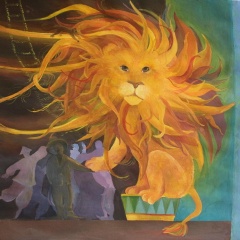Однажды профессор одного известного университета задал своим студентам вопрос:
- Является ли Бог создателем всего сущего?
Один из студентов храбро ответил:
- Да, является!
- То есть, вы считаете, что Бог создал все? - спросил профессор.
- Да, - повторил студент.
- Если Бог создал все, тогда Он создал и зло. А в соответствии с общеизвестным принципом, утверждающим, что по нашему поведению и нашим делам можно судить, кто мы такие, мы должны сделать вывод, что Бог есть зло, - сказал на это профессор.
Студент замолчал, поскольку не мог найти аргументов против железной логики преподавателя. Профессор же, довольный собой, похвастался перед студентами, что еще раз доказал им, что религия есть миф, придуманный людьми.
Но тут второй студент поднял руку и спросил:
- Можно в связи с этим задать вам вопрос, профессор?
- Конечно.
- Профессор, существует ли холод?
- Что за вопрос?! Конечно, существует. Вам же когда-нибудь бывает холодно?
Некоторые студенты захихикали над простецким вопросом своего товарища. Он же продолжил:
- В действительности, холода нет. Согласно законам физики то, что мы считаем холодом, есть отсутствие тепла. Только объект, испускающий энергию, поддается изучению. Тепло есть то, что заставляет тело или материю испускать энергию. Абсолютный ноль (- 273° С) есть полное отсутствие тепла, и любая материя при такой температуре становится инертной и неспособной реагировать. Холода в природе нет. Люди придумали это слово, чтобы описать свои ощущения, когда им не хватает тепла.
Затем студент продолжил:
- Профессор, существует ли тьма?
- Конечно, существует, и вы это знаете сами... - ответил профессор.
Студент возразил:
- И здесь вы неправы, тьмы также нет в природе. Тьма, в действительности, есть полное отсутствие света. Мы можем изучать свет, но не тьму. Мы можем использовать призму Ньютона для того, чтобы разложить свет на его составляющие и измерить длину каждой волны. Но тьму нельзя измерить. Луч света может осветить тьму. Но как можно определить уровень темноты? Мы измеряем лишь количество света, не так ли? Тьма - это слово, которое лишь описывает состояние, когда нет света.
Студент был настроен по-боевому и не унимался:
- Скажите, пожалуйста, так существует ли зло, о котором вы говорили?
Профессор, уже неуверенно, ответил:
- Конечно, я же объяснил это, если вы, молодой человек, внимательно меня слушали. Мы видим зло каждый день. Оно проявляется в жестокости человека к человеку, во множестве преступлений, совершаемых повсеместно. Так что зло все-таки существует.
На это студент опять возразил:
- И зла тоже нет, точнее, оно не существует само по себе. Зло есть лишь отсутствие Бога, подобно тому, как тьма и холод - отсутствие света и тепла. Это - всего лишь слово, используемое человеком, чтобы описать отсутствие Бога. Не Бог создал зло. Зло - это результат того, что случается с человеком, в сердце которого нет Бога. Это как холод, наступающий при отсутствии тепла, или тьма - при отсутствии света.
Профессор замолчал и сел на свое место. Студента звали Альберт Эйнштейн
- Является ли Бог создателем всего сущего?
Один из студентов храбро ответил:
- Да, является!
- То есть, вы считаете, что Бог создал все? - спросил профессор.
- Да, - повторил студент.
- Если Бог создал все, тогда Он создал и зло. А в соответствии с общеизвестным принципом, утверждающим, что по нашему поведению и нашим делам можно судить, кто мы такие, мы должны сделать вывод, что Бог есть зло, - сказал на это профессор.
Студент замолчал, поскольку не мог найти аргументов против железной логики преподавателя. Профессор же, довольный собой, похвастался перед студентами, что еще раз доказал им, что религия есть миф, придуманный людьми.
Но тут второй студент поднял руку и спросил:
- Можно в связи с этим задать вам вопрос, профессор?
- Конечно.
- Профессор, существует ли холод?
- Что за вопрос?! Конечно, существует. Вам же когда-нибудь бывает холодно?
Некоторые студенты захихикали над простецким вопросом своего товарища. Он же продолжил:
- В действительности, холода нет. Согласно законам физики то, что мы считаем холодом, есть отсутствие тепла. Только объект, испускающий энергию, поддается изучению. Тепло есть то, что заставляет тело или материю испускать энергию. Абсолютный ноль (- 273° С) есть полное отсутствие тепла, и любая материя при такой температуре становится инертной и неспособной реагировать. Холода в природе нет. Люди придумали это слово, чтобы описать свои ощущения, когда им не хватает тепла.
Затем студент продолжил:
- Профессор, существует ли тьма?
- Конечно, существует, и вы это знаете сами... - ответил профессор.
Студент возразил:
- И здесь вы неправы, тьмы также нет в природе. Тьма, в действительности, есть полное отсутствие света. Мы можем изучать свет, но не тьму. Мы можем использовать призму Ньютона для того, чтобы разложить свет на его составляющие и измерить длину каждой волны. Но тьму нельзя измерить. Луч света может осветить тьму. Но как можно определить уровень темноты? Мы измеряем лишь количество света, не так ли? Тьма - это слово, которое лишь описывает состояние, когда нет света.
Студент был настроен по-боевому и не унимался:
- Скажите, пожалуйста, так существует ли зло, о котором вы говорили?
Профессор, уже неуверенно, ответил:
- Конечно, я же объяснил это, если вы, молодой человек, внимательно меня слушали. Мы видим зло каждый день. Оно проявляется в жестокости человека к человеку, во множестве преступлений, совершаемых повсеместно. Так что зло все-таки существует.
На это студент опять возразил:
- И зла тоже нет, точнее, оно не существует само по себе. Зло есть лишь отсутствие Бога, подобно тому, как тьма и холод - отсутствие света и тепла. Это - всего лишь слово, используемое человеком, чтобы описать отсутствие Бога. Не Бог создал зло. Зло - это результат того, что случается с человеком, в сердце которого нет Бога. Это как холод, наступающий при отсутствии тепла, или тьма - при отсутствии света.
Профессор замолчал и сел на свое место. Студента звали Альберт Эйнштейн
Once a professor at a famous university asked his students a question:
- Is God the creator of everything?
One of the students bravely replied:
- Yes it is!
- So you think that God created everything? the professor asked.
“Yes,” the student repeated.
- If God created everything, then He created evil too. And in accordance with the well-known principle that we can judge who we are by our behavior and our deeds, we must conclude that God is evil, the professor said.
The student fell silent, because he could not find arguments against the iron logic of the teacher. The professor, pleased with himself, boasted to the students, which once again proved to them that religion is a myth invented by people.
But then the second student raised his hand and asked:
- May I ask you a question in this connection, professor?
- Sure.
- Professor, is there a cold?
- What's question?! Of course there is. Do you ever get cold?
Some of the students giggled at their friend's simple question. He continued:
- In reality, there is no cold. According to the laws of physics, what we consider to be cold is the absence of heat. Only an object that emits energy lends itself to study. Heat is what causes a body or matter to emit energy. Absolute zero (- 273 ° C) is a complete absence of heat, and any matter at such a temperature becomes inert and unable to react. There is no cold in nature. People coined this word to describe how they feel when they lack warmth.
The student then continued:
- Professor, does darkness exist?
- Of course it exists, and you know it yourself ... - the professor answered.
The student objected:
- And here you are wrong, there is no darkness in nature either. Darkness is, in reality, a complete absence of light. We can study light, but not darkness. We can use Newton's prism to decompose light into its components and measure the length of each wave. But darkness cannot be measured. A ray of light can illuminate the darkness. But how can you determine the level of darkness? We only measure the amount of light, right? Darkness is a word that only describes the state when there is no light.
The student was in a fighting mood and did not calm down:
- Tell me, please, does the evil you talk about exist?
The professor, already uncertainly, replied:
- Of course, I explained this, if you, young man, listened to me carefully. We see evil every day. It manifests itself in the cruelty of man to man, in the multitude of crimes committed everywhere. So evil does exist.
To this the student again objected:
- And there is no evil either, or rather, it does not exist by itself. Evil is only the absence of God, just as darkness and cold are the absence of light and heat. This is just a word used by man to describe the absence of God. God did not create evil. Evil is the result of what happens to a person who does not have God in his heart. It is like cold in the absence of heat, or darkness in the absence of light.
The professor fell silent and sat down in his place. The student's name was Albert Einstein
- Is God the creator of everything?
One of the students bravely replied:
- Yes it is!
- So you think that God created everything? the professor asked.
“Yes,” the student repeated.
- If God created everything, then He created evil too. And in accordance with the well-known principle that we can judge who we are by our behavior and our deeds, we must conclude that God is evil, the professor said.
The student fell silent, because he could not find arguments against the iron logic of the teacher. The professor, pleased with himself, boasted to the students, which once again proved to them that religion is a myth invented by people.
But then the second student raised his hand and asked:
- May I ask you a question in this connection, professor?
- Sure.
- Professor, is there a cold?
- What's question?! Of course there is. Do you ever get cold?
Some of the students giggled at their friend's simple question. He continued:
- In reality, there is no cold. According to the laws of physics, what we consider to be cold is the absence of heat. Only an object that emits energy lends itself to study. Heat is what causes a body or matter to emit energy. Absolute zero (- 273 ° C) is a complete absence of heat, and any matter at such a temperature becomes inert and unable to react. There is no cold in nature. People coined this word to describe how they feel when they lack warmth.
The student then continued:
- Professor, does darkness exist?
- Of course it exists, and you know it yourself ... - the professor answered.
The student objected:
- And here you are wrong, there is no darkness in nature either. Darkness is, in reality, a complete absence of light. We can study light, but not darkness. We can use Newton's prism to decompose light into its components and measure the length of each wave. But darkness cannot be measured. A ray of light can illuminate the darkness. But how can you determine the level of darkness? We only measure the amount of light, right? Darkness is a word that only describes the state when there is no light.
The student was in a fighting mood and did not calm down:
- Tell me, please, does the evil you talk about exist?
The professor, already uncertainly, replied:
- Of course, I explained this, if you, young man, listened to me carefully. We see evil every day. It manifests itself in the cruelty of man to man, in the multitude of crimes committed everywhere. So evil does exist.
To this the student again objected:
- And there is no evil either, or rather, it does not exist by itself. Evil is only the absence of God, just as darkness and cold are the absence of light and heat. This is just a word used by man to describe the absence of God. God did not create evil. Evil is the result of what happens to a person who does not have God in his heart. It is like cold in the absence of heat, or darkness in the absence of light.
The professor fell silent and sat down in his place. The student's name was Albert Einstein

У записи 54 лайков,
3 репостов,
2403 просмотров.
3 репостов,
2403 просмотров.
Эту запись оставил(а) на своей стене Евгений Марон



































































